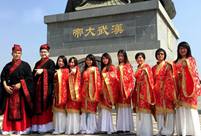

Gov't should provide more incentives for innovation
China has the largest number of science and technology staff in the world, according to the latest government report, but experts said it will take time for China to become a global force in science and technology.
The number of people involved in science and technology in China was 71 million in 2013, or 522 for every 10,000 people, said the Science and Technology Talent Development Report in 2014 released by the Ministry of Science and Technology on Monday.
China has exceeded the US in the number of research and development staff, with 3.5 million in 2013, 77.6 percent of whom were in private and State-owned companies, according to the report.
Analysts said the increase in the number of staff members will offer a larger talent reservoir to support the nation's future development, but more needs to be done to cultivate more talent at home and attract those overseas to return to China.
"The number should not pose as a surprise since China has the largest population in the world. It does not mean China belongs to countries known for advanced science and technology," Zhou Haiwang, deputy director of the Institute of Population and Development of the Shanghai Academy of Social Sciences, told the Global Times.
The number of people holding at least a bachelor's degree is an important gauge of influence in science and technology, but China has a low percentage in this field, according to Zhou.
The number in China was 4.8 percent in 2000 and 48.1 percent in the US during the same period, according to a thesis published on the official website of the Chinese Academy of Social Sciences.
"Higher education in China used to pay less attention on quality than quantity, while the shortage in research equipment also restricted the cultivation of domestic talent. Compared with better job offers from developed countries, it is difficult to attract top Chinese students overseas to return to China," Zhou said.
Some organizations and institutions do not evaluate talent on their contributions but on some other things, like the number of theses published in core journals, which is bad for the development of science and technology, said Lin Xinqi, director of the Human Resources Department of the Renmin University of China.
"The government should provide better policies to attract overseas talent and incentives to encourage innovation," Lin told the Global Times.
China launched the Medium- and Long-term Talent Development Plan (2010-20), including financial support to talent as well as research institutes.
 Creative graduation caps of ‘vigorous elves’
Creative graduation caps of ‘vigorous elves’ Hong Kong in lens
Hong Kong in lens Typhoon class strategic Submarine in photos
Typhoon class strategic Submarine in photos Hong Kong college students feel the charm of Hanfu
Hong Kong college students feel the charm of Hanfu Japan’s crimes committed against "comfort women"
Japan’s crimes committed against "comfort women" Odd news:“carrying a rod and asking to be spanked”
Odd news:“carrying a rod and asking to be spanked” Legendary life of a bee-keeping master in Hainan
Legendary life of a bee-keeping master in Hainan 4-year-old cute 'monk' spends summer holiday in temple
4-year-old cute 'monk' spends summer holiday in temple College graduates shining on the red carpet in Nanjing
College graduates shining on the red carpet in Nanjing Pledging allegiance reinforces Constitution
Pledging allegiance reinforces Constitution  Market falls amid fears about unregulated margin lending
Market falls amid fears about unregulated margin lending  Mass wedding for North Korean defectors held in Seoul
Mass wedding for North Korean defectors held in Seoul  Orthodox Church sees opportunities in China following enhanced Sino-Russian ties
Orthodox Church sees opportunities in China following enhanced Sino-Russian tiesDay|Week